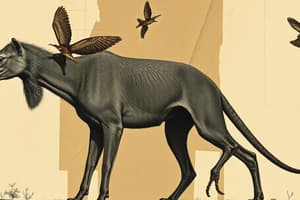Podcast
Questions and Answers
What is the scientific study of animals called?
What is the scientific study of animals called?
- Anthropology
- Ecology
- Botany
- Zoology (correct)
Which subdiscipline of zoology focuses on the study of insects?
Which subdiscipline of zoology focuses on the study of insects?
- Mammalogy
- Herpetology
- Ichthyology
- Entomology (correct)
Natural selection is best defined as:
Natural selection is best defined as:
- The mechanism by which species evolve (correct)
- Adaptations to human activity
- The formation of new animal species
- The study of animal behavior
Which of the following is a method of study used in zoology?
Which of the following is a method of study used in zoology?
What is taxonomy primarily concerned with?
What is taxonomy primarily concerned with?
Which group of animals lacks a backbone?
Which group of animals lacks a backbone?
What is the purpose of conservation in zoology?
What is the purpose of conservation in zoology?
Which of the following is NOT considered a major animal group?
Which of the following is NOT considered a major animal group?
Which of the following best defines adaptation?
Which of the following best defines adaptation?
What career role does an ethologist primarily focus on?
What career role does an ethologist primarily focus on?
Flashcards are hidden until you start studying
Study Notes
Introduction to Zoology
- Definition: Zoology is the scientific study of animals, their behavior, structure, physiology, classification, and distribution.
- Branch of biology that focuses specifically on animal life.
Subdisciplines of Zoology
- Entomology: Study of insects.
- Ornithology: Study of birds.
- Ichthyology: Study of fish.
- Mammalogy: Study of mammals.
- Herpetology: Study of reptiles and amphibians.
- Comparative Anatomy: Study of similarities and differences in the anatomy of different species.
- Ethology: Study of animal behavior.
- Ecology: Study of how animals interact with their environment.
Key Concepts
- Taxonomy: Classification of animals into groups (kingdom, phylum, class, order, family, genus, species).
- Evolution: Study of species' development over time through natural selection.
- Physiology: Understanding the functions and processes of animal bodies.
- Anatomy: Study of animal body structure and systems.
Major Animal Groups
- Invertebrates: Animals without a backbone (e.g., sponges, cnidarians, mollusks, arthropods).
- Vertebrates: Animals with a backbone (e.g., fish, amphibians, reptiles, birds, mammals).
Methods of Study
- Field Studies: Observing animals in their natural habitats.
- Laboratory Research: Conducting controlled experiments, often on live specimens.
- Comparative Analysis: Comparing species to understand evolutionary relationships.
Evolutionary Theory
- Natural Selection: Mechanism by which species evolve; traits that enhance survival and reproduction become more common.
- Adaptation: Changes in species over generations to better fit their environment.
- Speciation: Process by which new species arise from existing species.
Conservation and Biodiversity
- Importance of preserving animal species and habitats.
- Impact of human activities on ecosystems (habitat destruction, pollution, climate change).
- Role of zoologists in conservation efforts and wildlife management.
Career Opportunities in Zoology
- Research scientist in academia or industry.
- Wildlife biologist or conservationist.
- Animal behaviorist or ethologist.
- Zoo or aquarium curator and trainer.
- Educator in schools or museums.
Introduction to Zoology
- Zoology is the scientific study of animals, focusing on their behavior, structure, physiology, classification, and distribution.
- It is a fundamental branch of biology.
Subdisciplines of Zoology
- Entomology studies insects.
- Ornithology studies birds.
- Ichthyology studies fish.
- Mammalogy studies mammals.
- Herpetology studies reptiles and amphibians.
- Comparative Anatomy focuses on comparing the anatomy of different species.
- Ethology focuses on animal behavior.
- Ecology studies how animals interact with their environment.
Taxonomy and Classification
- Taxonomy is the system of classifying animals into hierarchical groups, like kingdom, phylum, class, order, family, genus, and species.
Evolution and Adaptation
- Evolution is the process of species changing over time through natural selection.
- Natural Selection is the driving force of evolution, favoring traits that enhance survival and reproduction.
- Adaptation refers to the changes that species undergo to better suit their environments.
Animal Groups
- Invertebrates are animals without a backbone, including groups like sponges, cnidarians, mollusks, and arthropods.
- Vertebrates are animals with a backbone, including fish, amphibians, reptiles, birds, and mammals.
Studying Animals
- Field Studies involve observing animals in their natural habitats.
- Laboratory Research involves conducting controlled experiments, often using live specimens.
- Comparative Analysis involves comparing different species to understand evolutionary relationships.
Conservation and Biodiversity
- Conservation is crucial to preserve animal species and habitats.
- Human activities have a significant impact on ecosystems, leading to habitat destruction, pollution, and climate change.
- Zoologists play a vital role in conservation efforts and wildlife management.
Career Paths in Zoology
- Zoologists work in various fields such as academic research, industry, wildlife management, animal behavior research, zoo or aquarium curatorship, and education.
Studying That Suits You
Use AI to generate personalized quizzes and flashcards to suit your learning preferences.




